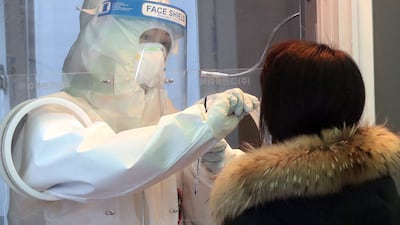When will the pandemic end? This is the question hanging over just about everything since Covid-19 took over the world last year.
The answer lies in the rate of vaccinations.
Bloomberg built the largest database of Covid-19 inoculations given around the world, which showed that more than 119 million doses were administered in 67 countries by February 5.
US health officials such as Anthony Fauci suggested it will take 70 per cent to 85 per cent coverage of the population for things to return to normal.
On a global scale, that is a daunting level of vaccination. Shots are being delivered at an average rate of 4.54 million a day. At this rate, it would take years to achieve a significant level of global immunity. The rate, however, is steadily increasing, and new vaccines by additional manufacturers may soon be available.
Bloomberg’s vaccine tracker shows that some countries are making far more rapid progress than others towards achieving 75 per cent coverage with a two-dose vaccine.
Israel, the country with the highest vaccination rate in the world, is on course to reach 75 per cent coverage in just two months.
The UAE is also expected to inoculate 75 per cent of the population with a two-dose vaccine within two months.
The US will get there just in time to ring in the 2022 new year (although North Dakota could get there six months sooner than Texas).
More Americans have now received at least one vaccine dose than have tested positive for the virus since the pandemic began. In the past week, an average of 1.34 million doses a day were administered.
With vaccinations happening more rapidly in richer western countries than the rest of the globe, it will take the world as a whole seven years at the current pace.
Bloomberg’s calculator provides a snapshot in time, designed to put today’s vaccination rates into perspective.
It uses the most recent rolling average of vaccinations, which means that as vaccination numbers pick up, the time needed to hit the 75 per cent threshold will fall.
The calculations will be volatile, especially in the early days, and the numbers can be distorted by temporary disruptions.
For example, New York’s target date was briefly pushed out to 17 months this week after a winter blizzard prevented some from getting vaccinated (it is now back down to 13 months).
Likewise, Canada’s vaccination rate dropped by half in recent weeks after reports of delayed vaccine shipments. Based on Canada’s latest rate of inoculations it would take more than 10 years to reach 75 per cent coverage.
That might serve as a wake-up call to Canadian politicians and health officials, but it does not mean the country is doomed to a decade of social distancing. Canada has contracts to buy more vaccine doses per person than any other country and its vaccination rates are expected to climb.
The pace is likely to accelerate as more vaccines become available. Some of the world’s biggest vaccine-manufacturing centres in India and Mexico are only just getting started.
More than 8.5 billion doses of vaccine have been contracted by countries through more than 100 agreements tracked by Bloomberg.
Only a third of countries have begun their vaccination campaigns.
Getting to herd immunity
Vaccinations protect against Covid-19 within a few weeks of getting the shots. But if just a few people in a community get vaccinated, the virus can continue to spread unchecked.
As more people get the vaccine, groups of people start to build a collective defence against the virus so that isolated sparks of infection burn out instead of spreading into an outbreak. The concept is known as herd immunity.
In the scientific community, there are conflicting definitions for when herd immunity is achieved.
Is it when enough people are protected that it begins to have a measurable effect on the speed of transmission? That could begin well before 75 per cent of people are inoculated.
Others define it as the point when outbreaks can no longer be sustained. For example, even if there is a cluster of measles cases in an unvaccinated community, herd immunity prevents it from rippling across a country.
Tracking global vaccines
The vaccines available today require two doses for full vaccination. Bloomberg's calculations for coverage are based on two doses per person in the population but do not distinguish between first doses or second doses administered. Those breakdowns can distort daily vaccination rates and are not available in more than 20 per cent of the countries that are being tracked.
And although the vaccines available have not yet been authorised for use in children, Bloomberg's calculator includes children in the population as needing to be protected.
One metric Bloomberg’s calculator does not account for is any level of natural immunity that might result from recovering from Covid-19. It is possible that hard-hit places might require a lower level of vaccination to prevent widespread transmission.
While there is evidence that people who recover from the illness retain some level of natural defences, it is unclear how much protection is offered or how long it might last. The vaccine is still recommended for people who have recovered.










